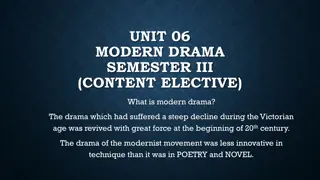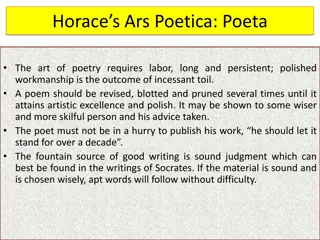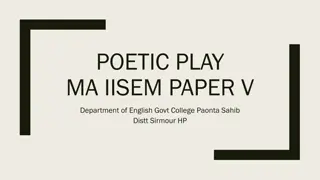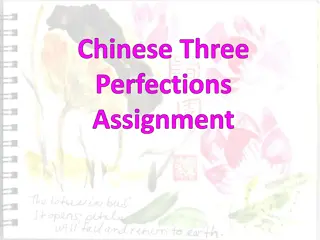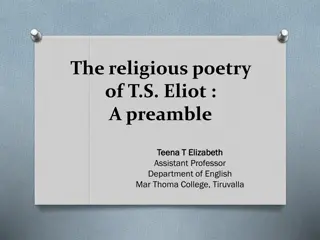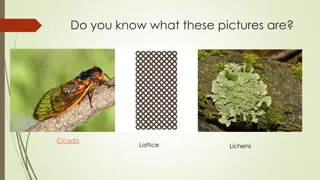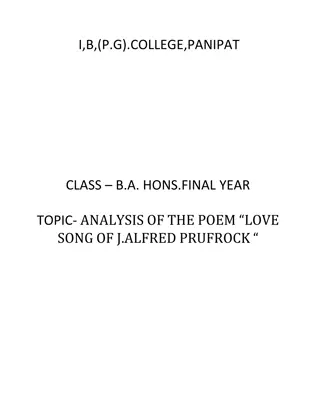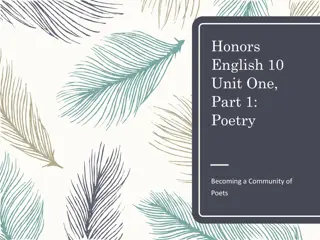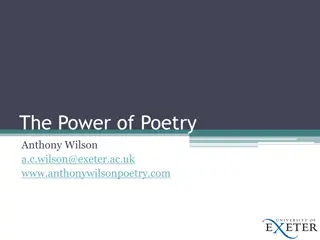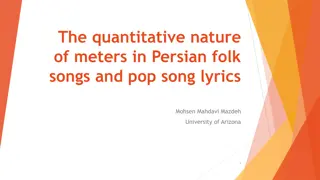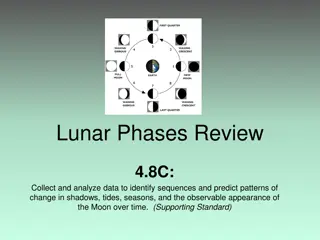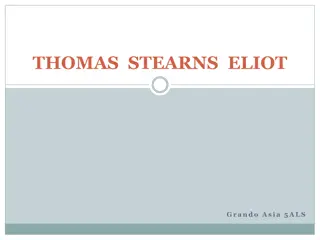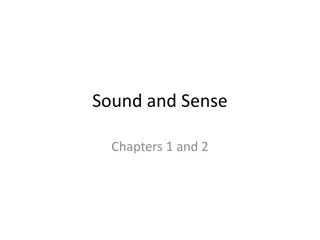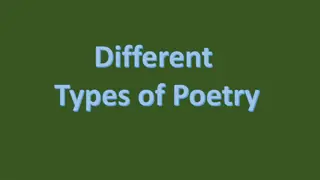Exploration of T.S. Eliot: Life, Style, and Poetry Phases
Highly influenced by family, T.S. Eliot was a versatile writer known for his classicism, innovation, and profound philosophical insights. His poetry evolved through distinct phases, from juvenile works to religious themes, reflecting his changing perspectives on society and faith. Eliot's theory of poetry emphasized tradition, impersonality, and the objective correlative, rejecting simplistic subjectivism and embracing complexity. The Love Song of J. Alfred Prufrock stands as a testament to his mastery of language and introspective exploration.
Download Presentation

Please find below an Image/Link to download the presentation.
The content on the website is provided AS IS for your information and personal use only. It may not be sold, licensed, or shared on other websites without obtaining consent from the author. Download presentation by click this link. If you encounter any issues during the download, it is possible that the publisher has removed the file from their server.
E N D
Presentation Transcript
T.S. ELIOT 1888-1965 Prufrock
Life: 1. highly influenced by grandfather, mother and father. 2. brilliant student, technical proficiency, sense of humor. 3. British or American? 4. Current sailing images in his poetry?
Style & Works 1. Eliot is classicist, innovator, critic, social thinker, philosopher and mystic. 2. a writer of poetry, drama, literary and social essays.
His Poetry is divided into 5 phases 1. Juvenilia (1905-1909) ..school boy exercises, published in school and college magazines. 2. (1909-1917) ..written in Boston, Europe and first year in England ..French symbolists, urban streets, sophisticated people, rottenness and corruption, ironic treatment of love.
3. (1918-1925)..distress, corruption of European civilization, enlarged pessimistic in tone (reasons?), generic, symbolic characters. scope, fragmentation,
4. church, searching for right way and right solution, traditional imageryand material, optimistic tone. (1925-1935) ..Christian poetry, Anglican
5. (1935-1943)..more general religious poetry linked to a grim picture of modern society, problems of space and time, life and death, past and future, yet, there is faith and hope.
Theory of Poetry Against Georgian poetry. Complexity reaction and reflection. Rejection of Subjectivism.
Focus on tradition. Impersonality. Intensity.
Objective Correlative. Function of Poetry.
The Love Song of J. Alfred Prufrock S io credesse che mia risposta fosse Apersona che mai tornasse al mondo, Questa fiamma staria senza piu scosse. Ma perciocche giammai di questo fondo Non torno vivo alcun, s i odo il vero, Senza tema d infamia ti rispondo.
"If I thought that my reply would be to one who would ever return to the world, this flame would stay without further movement; but since none has ever returned alive from this depth, if what I hear is true, I answer you without fear of infamy."
Let us go then, you and I, When the evening is spread out against the sky Like a patient etherized upon a table; Let us go, through certain half-deserted streets, The muttering retreats Of restless nights in one-night cheap hotels And sawdust restaurants with oyster-shells:
Streets that follow like a tedious argument Of insidious intent To lead you to an overwhelming question ... Oh, do not ask, What is it? Let us go and make our visit. In the room the women come and go Talking of Michelangelo.
The yellow fog that rubs its back upon the window-panes, The yellow smoke that rubs its muzzle on the window-panes Licked its tongue into the corners of the evening, Lingered upon the pools that stand in drains, Let fall upon its back the soot that falls from chimneys, Slipped by the terrace, made a sudden leap, And seeing that it was a soft October night, Curled once about the house, and fell asleep.
And indeed there will be time For the yellow smoke that slides along the street, Rubbing its back upon the window panes; There will be time, there will be time To prepare a face to meet the faces that you meet; There will be time to murder and create,
And time for all the works and days of hands That lift and drop a question on your plate; Time for you and time for me, And time yet for a hundred indecisions, And for a hundred visions and revisions, Before the taking of a toast and tea.
In the room the women come and go Talking of Michelangelo.





